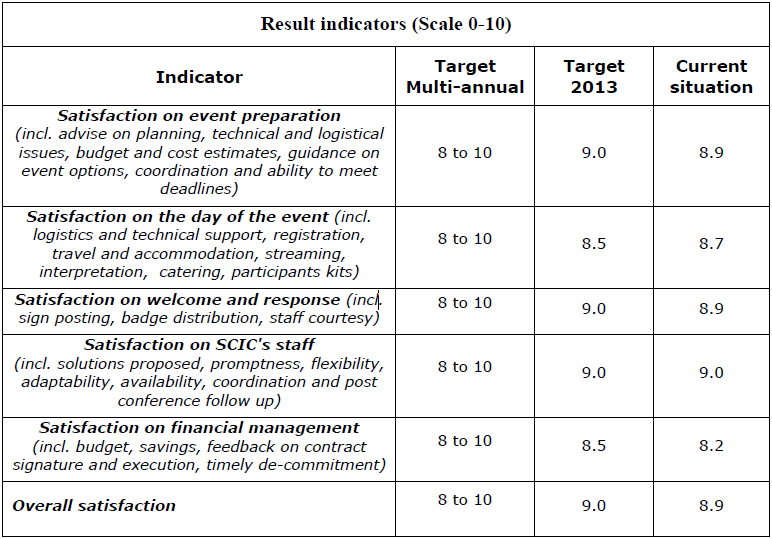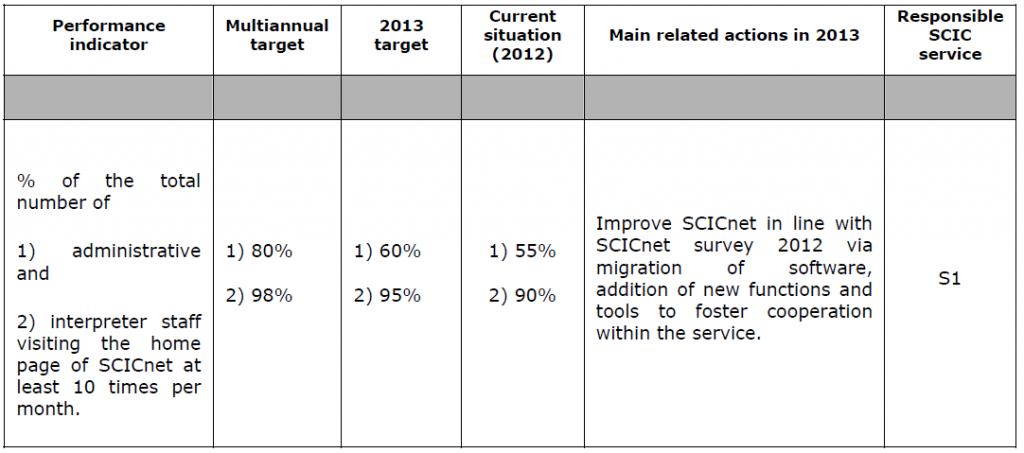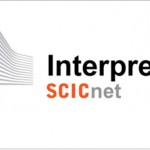Interpretation goes beyond words at EU level (Part two)
SCIC Management plan for horizontal activities
As promised, it is time to look at the specific objectives for ‘horizontal’ activities, which are framed in a multi annual perspective, aiming at supporting SCIC’s core activities.
They are divided, at their turn, in two categories:
1. Policy strategy and coordinationComprising Strategic planning and Internal communication, it defines the policy, preparation and implementation of SCIC’s mission, while trying to fit the time scale laid out. So, this activity aims at promoting the development of a strategic and administrative culture within the DG, supporting different means of information, communication, awareness raising and dialogue with decision makers as well as with other key stakeholders.
Indicators used:
Strategic planningThis function, designed to ensure that SCIC’s activities are aligned to the Commission’s priorities, well prepared and have enough resources allocated, mainly consists of translating the Commission’s work program intro operational objectives and resource allocation in the Annual Management plan. To support the strategic planning, it has developed a comprehensive report system (SCICView), allowing to monitor in real time all the relevant DG levels, from operational statistics to key performance indicators geared towards senior management.
E.g.: To automate the monitoring of the indicators set out in the Management plan:
Internal CommunicationMost of the interpreters do not have an office and they change their work location every day, depending on the conferences and the needed languages. Therefore, their only contact with the administrative structure is via electronic media, particularly SCICnet and SCIC intranet, which delivers information and offers access to many IT tools and applications that are crucial for the interpreters’ daily work. 3 strategic internal communication objectives have been set in place:
– “Better Communication tools”
– “One service”
– “Improving information exchange”
In order to measure how effective these actions are, a new one has been established for 2013: monitoring the access frequency on the home page of SCICnet, where key information about the DG is published. Mainly, they are looking to increase the access which could be an indicator of improved staff engagement.
2. Administrative support
This activity covers a set of functions that are designed to provide high quality administrative support, advice, assistance, control and monitoring of resources used by SCIC,
ICT ManagementThe ICT Management function is meant to improve IT Governance by creating a unit that is responsible for steering IT Governance in the DG and the system owners, correspondents and IT management committees and meetings.
It accounts for 3 main activities:
- Advising management on the IT strategy and IT-related decisions
- Ensuring that the DG’s Information systems and infrastructure are reliable
- Developing and maintaining the information systems that support the interpretation and meeting organization
Priorities for 2013:
- Continuing with the streamlining and rationalization of the DG’s application portfolio, in line with the Commission guidelines
- Preparing the implementation of ITIC, that is due 2013
- Preparing a “mobile web” strategy and launching the first application fit for it
- Improving the corporate system used for the management of meeting bookings
E.g: Recovery Point Objective (RPO) and Recovery history of data are in line with the business requirements (Maximum Tolerable Period of Disruption of SCIC critical activities):
Financial ManagementIt deals with planning, monitoring and reporting on the use of financial resources, while also verifying the regularity of the financial transactions.
E.g.: To ensure that the revenue deriving from the interpretation delivered to SLA clients is collected within a reasonable delay.
HR ManagementThe main objective is to provide a high quality service for the DG, by ensuring an effective and correct implementation of the human resources programs relating to employment conditions, career and personal development. Also, it makes sure that proper actions are taken so that the right resources are allocated in the right place at the right time.
E.g.: To ensure a stable and balanced gender representation at middle management level:
To ensure that new officials are aware of their obligations in the field of ethics:
Looking forward to see the whether they have achieved their objectives at the end of the year and also, the next management plan.
References:

Tags: Human Resources performance, Information Technology performance, Performance Measurement, SCIC Management












